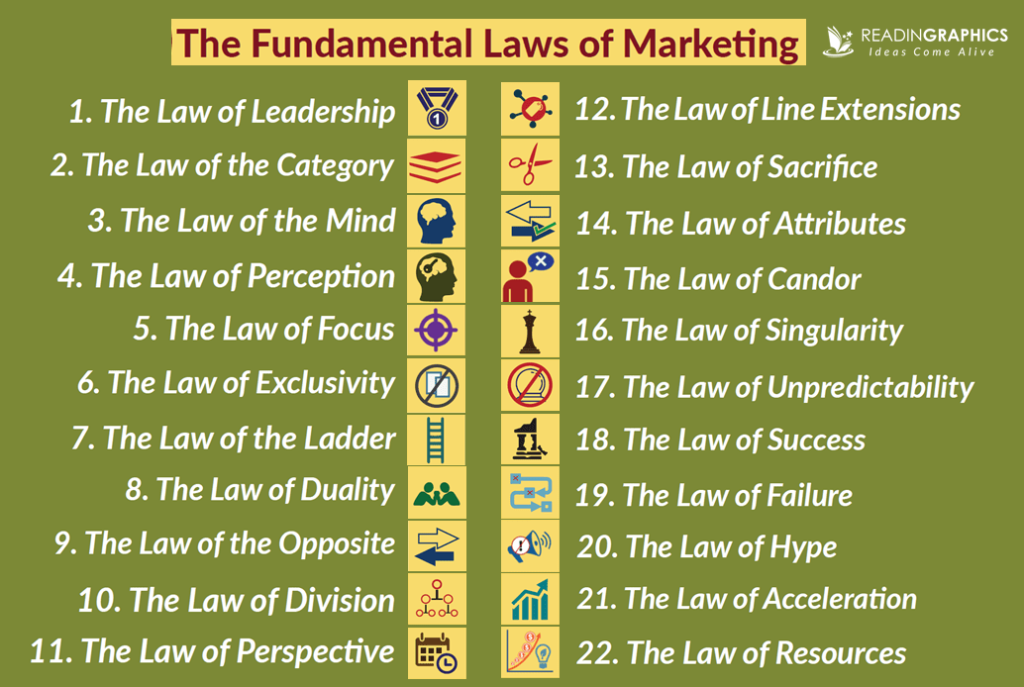The 22 Immutable Laws of Marketing

The 22 Immutable Laws of Marketing by Al Ries and Jack Trout is a must-read for anyone interested in marketing and branding. The book lays out 22 timeless principles that guide successful marketing strategies. Here’s a breakdown of the book’s key insights, presented in a human and relatable way.
Introduction: The Battlefield of Perception
Ries and Trout begin with a compelling argument: marketing is not a battle of products but a battle of perceptions. It’s about how consumers perceive your product relative to your competitors. In the crowded marketplace, the winner isn’t necessarily the company with the best product but the one with the best-perceived product.
The 22 Immutable Laws of Marketing
The Law of Leadership
It’s better to be first than it is to be better. The idea here is simple—if you’re first in the consumer’s mind, you’ve won half the battle. Think of Coca-Cola as the first cola drink or Google as the first significant search engine. These brands dominate because they were first in their categories.The Law of the Category
If you can’t be first in a category, create a new category you can be first in. This law encourages brands to think outside the box. For example, Apple wasn’t the first computer, but it became the first in the “user-friendly computer” category.The Law of the Mind
It’s better to be first in the mind than to be first in the marketplace. This law is all about positioning. Even if you’re not the first in the market, you can still win by being the first in the customer’s mind. For example, while IBM was the first in computers, Microsoft positioned itself as the leader in software.The Law of Perception
Marketing is not a battle of products; it’s a battle of perceptions. What consumers believe about your product is more important than the product itself. Perception often trumps reality in marketing.The Law of Focus
The most powerful concept in marketing is owning a word in the prospect’s mind. This is about narrowing your focus to a single word or concept that you want to own. For example, Volvo owns “safety,” and FedEx owns “overnight.”The Law of Exclusivity
Two companies cannot own the same word in the prospect’s mind. Once a competitor owns a word, it’s tough to dislodge them. For instance, Coca-Cola owns “authentic,” while Pepsi took “youth.”The Law of the Ladder
The strategy you use depends on which rung you occupy on the ladder. This law suggests that the brand’s strategy should be dictated by its position in the market. If you’re not first, figure out where you stand and craft your strategy accordingly.The Law of Duality
In the long run, every market becomes a two-horse race. Competition tends to narrow down to two players. Think Coca-Cola vs. Pepsi or Boeing vs. Airbus.The Law of the Opposite
If you’re shooting for second place, your strategy is determined by the leader. If you can’t be number one, differentiate yourself by being the opposite of the leader. Pepsi’s “Choice of a New Generation” was an effective counter to Coca-Cola’s traditional image.The Law of Division
Over time, a category will divide and become two or more categories. Categories evolve, and new niches form. Computers divided into personal computers, laptops, tablets, etc.The Law of Perspective
Marketing effects take place over an extended period. What works in the short term may not work in the long term. For example, discounting can drive immediate sales but can damage brand equity over time.The Law of Line Extension
There’s an irresistible pressure to extend the equity of the brand. Line extensions can dilute your brand’s power if not done carefully. While it might seem like a good idea to extend a brand, it can backfire, as seen with the failure of “New Coke.”The Law of Sacrifice
You have to give up something to get something. This law advises focusing on a narrower target market to succeed. You can’t be all things to all people.The Law of Attributes
For every attribute, there is an opposite, effective attribute. If your competitor owns an attribute, go for the opposite. While Coca-Cola owns “classic,” Pepsi positioned itself as “young and modern.”The Law of Candor
When you admit a negative, the prospect will give you a positive. Being honest about a drawback can enhance your credibility. Avis successfully used this by admitting they were second to Hertz, with the tagline, “We try harder.”The Law of Singularity
In each situation, only one move will produce substantial results. The idea here is that success often comes from a single, focused action rather than a broad effort.The Law of Unpredictability
Unless you write your competitor’s plans, you can’t predict the future. This law emphasizes the need for flexibility in marketing strategies. The market changes, and so should your approach.The Law of Success
Success often leads to arrogance, and arrogance to failure. The moment you think you’ve made it is the moment you start to lose touch with the market. Many companies fail because they rest on their laurels.The Law of Failure
Failure is to be expected and accepted. This law suggests that companies should not be afraid to fail, as failure can lead to valuable lessons and, ultimately, success.The Law of Hype
The situation is often the opposite of the way it appears in the press. The more hype a product gets, the more likely it is to fail. Hype can create unrealistic expectations.The Law of Acceleration
Successful programs are not built on fads, they’re built on trends. A fad is short-lived, but a trend has long-term potential. The key is to capitalize on trends without getting swept away by fads.The Law of Resources
Without adequate funding, an idea won’t get off the ground. Even the best marketing strategy will fail if not backed by sufficient resources. Companies need to invest in their marketing to ensure success.
Conclusion: Marketing as a Guiding Force
Ries and Trout’s “The 22 Immutable Laws of Marketing” provides timeless guidance that remains relevant in today’s digital age. Whether you’re launching a new product or trying to revive an existing one, these laws offer a roadmap to navigating the complex world of marketing. By focusing on perception, positioning, and the power of simplicity, businesses can increase their chances of success in a competitive landscape.
Understanding and applying these laws can help businesses not just survive but thrive, ensuring they leave a lasting impression in the minds of consumers.

